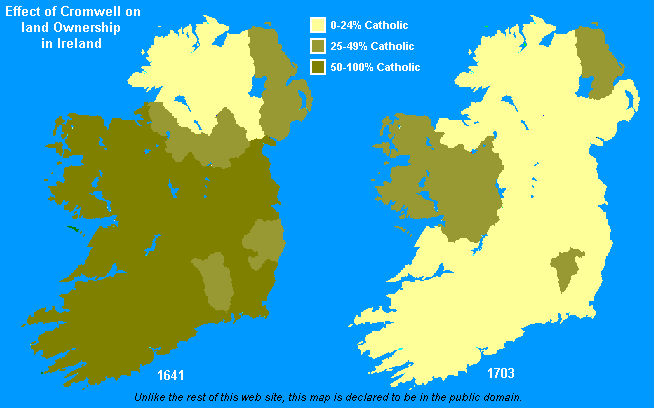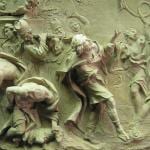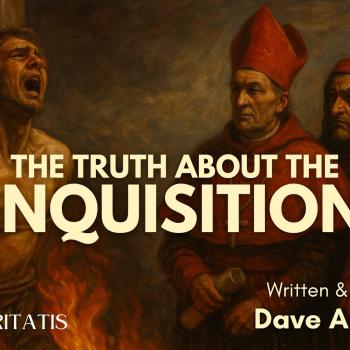
[Slightly abridged version of Part III of the article, “Penal Laws,” in The Catholic Encyclopedia; written by Edwin Burton, E. A. D’Alton & Jarvis Kelley, 1911; originally posted on my website on 3-10-08]
*****
Although the penal laws of Ireland were passed by a Protestant Parliament and aimed at depriving Catholics of their faith, such laws were not the outcome of religious motives only. They often came from a desire to possess the lands of the Irish. When Henry VIII broke with Rome sectarian rancour came to embitter racial differences. The English Parliament passed the Act of Supremacy, making Henry head of the Church; but the Irish Parliament was less compliant, and did not pass the bill till the legislative powers of the representatives of the clergy had been taken away. And though the Act of Supremacy (1536) was accepted by so many Irish chiefs, they were not followed by the clergy or people in their apostasy. The suppression of monasteries followed entailing the loss of so much property and even of many lives.
Yet little progress was made with the new doctrines either in Henry’s reign or in that of his successor, and Mary’s restoration of the Faith led the Protestant Elizabeth to again resort to penal laws. In 1559 the Irish Parliament passed both the Act of Supremacy and the Act of Uniformity, the former prescribing to all officers the Oath of Supremacy, the latter prohibiting the Mass and commanding the public use of the Book of Common Prayer. Whoever refused the Oath of Supremacy was dismissed from office, and whoever refused to attend the Protestant service was fined 12 pence for each offence. A subsequent viceregal proclamation ordered all priests to leave Dublin and prohibited the use of images, candles, and beads.
For some time these Acts and proclamations were not rigorously enforced; but after 1570, when Elizabeth was excommunicated by the pope, toleration ceased; and the hunting down of the Earl of Desmond, the desolation of Munster, the torturing of O’Hurley and others, showed how merciless the queen and her ministers could be. Elizabeth disliked Parliaments and had but two in her reign in Ireland. She governed by proclamation, as did her successor, James, and it was under a proclamation (1611) that the blood of O’Devany, Bishop of Down, was shed. In the next reign there were periods of toleration followed by the false promises of Strafford and the attempted spoliation of Connaught, until at last the Catholics took up arms.
Cromwell disliked Parliaments as much as Elizabeth or James, and when he had extinguished the Rebellion of 1641, he abolished the Irish Parliament, giving Ireland a small representation at Westminster. It was by Acts of this Westminster Parliament that the Cromwellian settlement was carried out, and that so many Catholics were outlawed. As for ecclesiastics, no mercy was shown them under Cromwellian rule. They were ordered to leave Ireland, and put to death if they refused, or deported to the Arran Isles or to Barbadoes, and those who sheltered them at home were liable to the penalty of death. To such an extent was the persecution carried that the Catholic churches were soon in ruins, a thousand priests were driven into exile, and not a single bishop remained in Ireland but the old and helpless Bishop of Kilmore.
With the accession of Charles II the Irish Catholics looked for a restoration of lands and liberties; but the hopes raised by the Act of Settlement (1663) were finally dissipated by the Act of Explanation (1665), and the Catholics, plundered by the Cromwellians, were denied even the justice of a trial. The English Parliament at the same time prohibited the importation into England of Irish cattle, sheep, or pigs. The king favoured toleration of Catholicity, but was overruled by the bigotry of the Parliament in England and of the viceroy, Ormond, in Ireland; and if the reign of Charles saw some toleration, it also saw the judicial murder of Venerable Oliver Plunkett and a proclamation by Ormond in 1678, ordering that all priests should leave the country, and that all Catholic churches and convents should be closed.
The triumph of the Catholics under James II was short-lived. But even when William of Orange had triumphed, toleration of Catholicity was expected. For the Treaty of Limerick (1691) gave the Catholics “such privileges as they enjoyed in the reign of Charles II”; and William was to obtain from the Irish Parliament a further relaxation of the penal laws in existence. The treaty was soon broken. The English Parliament, presuming to legislate for Ireland, enacted that no one should sit in the Irish Parliament without taking the Oath of Supremacy and subscribing to a declaration against Transubstantiation; and the Irish Parliament, filled with slaves and bigots, accepted this legislation: Catholics were thus excluded; and in spite of the declared wishes of King William, the Irish Parliament not only refused to relax the Penal Laws in existence but embarked on fresh penal legislation. Session after session for nearly fifty years, new and more galling fetters were forged, until at last the Penal Code was complete, and well merited the description of Burke:
as well fitted for the oppression, impoverishment and degradation of a feeble people and the debasement in them of human nature itself as ever proceeded from the perverted ingenuity of man.
All bishops, deans, vicars-general, and friars were to leave the country and if they returned, to be put to death. Secular priests at home could remain if they were registered; in 1709, however, they were required to take an oath of abjuration which no priest could conscientiously take, so that registration ceased to be a protection. They could not set up schools at home nor resort to Catholic schools abroad, nor could they receive legacies for Catholic charities, nor have on their churches steeple, cross, or bell.
The laity were no better off than the clergy in the matter of civil rights. They could not set up Catholic schools, nor teach in such, nor go abroad to Catholic schools. They were excluded from Parliament, from the corporations, from the army and navy, from the legal profession, and from all civil offices. They could not act as sheriffs, or under sheriffs, or as jurors, or even as constables. They could not have more than two Catholic apprentices in their trade; they could not carry arms, nor own a horse worth more than 5 pounds; they were excluded even from residence in the larger corporate towns. To bury their dead in an old ruined abbey or monastery involved a penalty of ten pounds. A Catholic workman refusing to work on Catholic holy days was to be whipped; and there was the same punishment for those who made pilgrimages to holy wells.
No Catholic could act as guardian to an infant, nor as director of the Bank of Ireland; nor could he marry a Protestant, and the priest who performed such a marriage ceremony was to be put to death. A Catholic could not acquire land, nor buy it, nor hold a mortgage on it; and the Catholic landlord was bound at death to leave his estate to his children in equal shares. During life, if the wife or son of such became a Protestant, she or he at once obtained separate maintenance. The law presumed every Catholic to be faithless, disloyal, and untruthful, assumed him to exist only to be punished, and the ingenuity of the Legislature was exhausted in discovering new methods of repression.
Viceroys were constantly appealed to to give no countenance to Popery; magistrates, to execute the penal laws; degraded Irishmen called priest-hunters were rewarded for spying upon their priests, and degraded priests who apostatized were rewarded with a government pension. The wife was thus encouraged to disobey her husband, the child to flout his parents, the friend to turn traitor to his friend. These Protestant legislators in possession of Catholic lands wished to make all Catholics helpless and poor. Without bishops they must soon be without priests, and without schools they must necessarily go to the Protestant schools.
These hopes however proved vain. Students went to foreign colleges, and bishops came from abroad, facing imprisonment and death. The schoolmaster taught under a sheltering hedge, and the priest said Mass by stealth watched over by the people and in spite of priest-hunter and penal laws. In other respects the Penal Laws succeeded. They made the Catholics helpless, ignorant, and poor, without the strength to rebel, the hope of redress, or even the courage to complain.
At last the tide turned. Too poor to excite the cupidity of their oppressors, too feeble to rebel, the Catholics had nevertheless shown that they would not become Protestants; and the repression of a feeble people, merely for the sake of repression, had tarnished the name of England, and alienated her friends among the Catholic nations. In these circumstances the Irish Parliament began to retrace its steps, and concessions were made, slowly and grudgingly.
At first the Penal Laws ceased to be rigorously enforced, and then in 1771, Catholics were allowed to take leases of unreclaimed bog for sixty-one years. Three years later they were allowed to substitute an Oath of Allegiance for the Oath of Supremacy; and in 1778 Gardiner’s Act allowed them to take leases of land for 999 years, and also allowed Catholic landlords to leave their estates to one son, instead of having, as hitherto, to divide between all. In 1782 a further Act enabled Catholics to set up schools, with the leave of the Protestant bishop of the place, enabling them also to own horses in the same way as Protestants, and further permitting bishops and priests to reside in Ireland. Catholics were also allowed to act as guardians to children.
Not till 1792 was there a further Act allowing Catholics to marry Protestants, to practise at the bar, and to set up Catholic schools without obtaining a licence from the Protestant bishop. The Catholic Relief Bill of 1793 gave Catholics the parliamentary and municipal franchise, enabled them to become jurors, magistrates, sheriffs, and officers in the army and navy. They might carry arms under certain conditions, and they were admitted to the degrees of Trinity College, though not to its emoluments or higher honours.
Emancipation was delayed till 1829. Nor would it have come even then but for the matchless leadership of O’Connell, and because the only alternative to concession was civil war. The manner of concession was grudging. Catholics were admitted to Parliament, but the forty-shilling free-holders were disfranchised, Jesuits banished, other religious orders made incapable of receiving charitable bequests, bishops penalized for assuming ecclesiastical titles and priests for appearing outside their churches in their vestments. Catholics were debarred from being either viceroy or lord chancellor of Ireland. The law regarding Jesuits has not been enforced, but the viceroy must still be a Protestant. Nor was it till the last half-century that a Catholic could be lord chancellor, Lord O’Hagan, who died in 1880, being the first Catholic to fill that office since the Revolution of 1688.
See also:
“Ireland” (The Catholic Encyclopedia)
“Anti-Irish Sentiment” (Wikipedia)
Protestantism: Historic Persecution & Intolerance (Index Page)
430 Catholic Martyrs Murdered by Henry VIII (1534-1544) [2-6-08]
312 Catholic Martyrs & Confessors Under “Good Queen Bess” (Queen Elizabeth: r. 1558-1603) [2-8-08]
189 English Catholic Martyrs & Heroic Confessors: 1603-1729 [2-16-08]
***

















